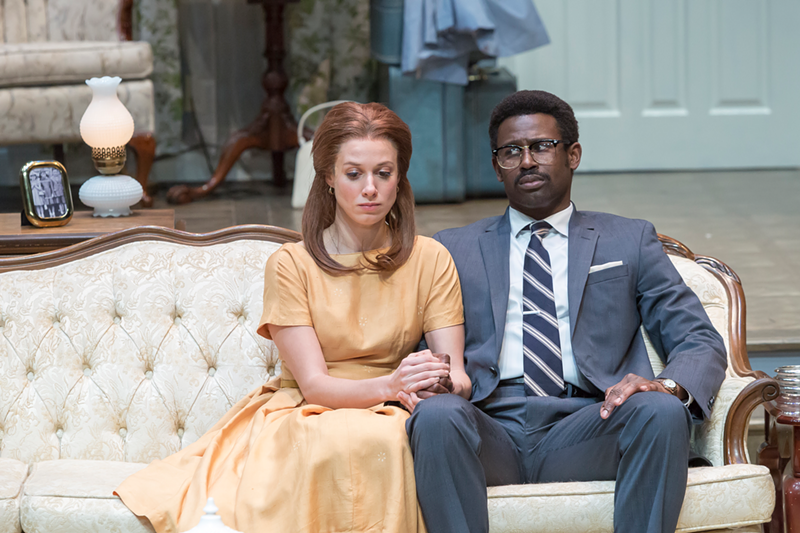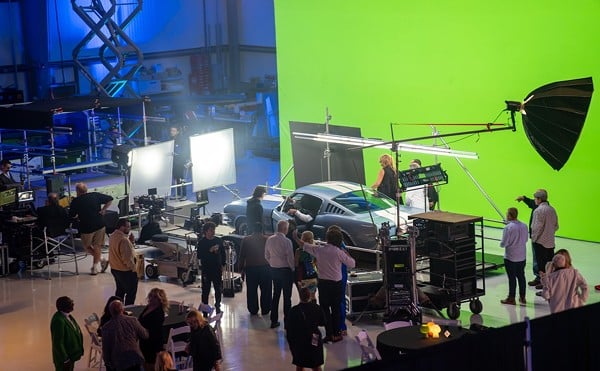CRITIC'S CHOICE
A half-century has passed since the film Guess Who’s Coming to Dinner? confronted moviegoers with social issues including racism, prejudice and mixed marriage. The story about a liberal, affluent white couple whose impetuous daughter returns home to announce her engagement after a whirlwind romance with an African-American physician both distilled and complicated conversations. There were no easy answers to many of the issues raised, although the film’s rather pat conclusion — perhaps necessary in the idealistic and hopeful late 1960s — offered a sense that differences could be overcome.
Fast forward to 2018: Currently onstage at Cincinnati Shakespeare Company, playwright Todd Kreidler’s 2012 adaptation of William Rose’s screenplay tinkers slightly with the story to reflect contemporary attitudes. The interplay between Christina and Matt Drayton — portrayed onscreen by iconic actors Katharine Hepburn and Spencer Tracy — has a more level playing field for Cincinnati performers Annie Fitzpatrick and Barry Mulholland. After the initial shock of daughter Joanna’s decision, Fitzpatrick’s Christina, who owns a high-end art gallery, argues more assertively with husband Matt.
Similarly the relationship between Joanna and fiancé John Prentice is more rooted in reality. In the movie Katharine Houghton played Joanna with breathless, naive optimism; Sidney Poitier brought Prentice to life in a steadfast, committed performance. Cincy Shakes’ veterans Caitlin McWethy and Darnell Pierre Benjamin play their parts more pragmatically. Her Joanna has more credibility, even though she initially states, “My parents love surprises!” Matt calls his daughter a “radical optimist,” but it’s evident that her good faith in her parents is severely damaged by his behavior, especially when he proclaims that her news is not a surprise, but an “ambush.”
McWethy plays Joanna with enthusiasm, but her depth of emotion has considerable texture, especially in the second act. Likewise, Benjamin gives the buttoned-down physician some serious volatility, especially interacting with his parents who make a startling, less-than-pleased entrance as dinner guests. Ken Early plays the senior John Prentice as an intransigent, backward-looking man who sees no good coming from this marriage. Thursday Farrar is Mary Prentice, the doctor’s more understanding but reticent mother.
Three more characters provide further perspectives that expand the issues underpinning Guess Who’s Coming to Dinner? Kelly Mengelkoch plays Hillary St. George, the art gallery’s tightly wound and subtly racist manager, who eventually gets her comeuppance. Jim Hopkins is a Catholic monsignor and family friend who seeks to turn down the heat but delivers a boatload of unhelpful platitudes, not to mention offers to smooth tensions with liquor. Finally, Burgess Byrd is the Draytons’ faithful maid, Tillie Binks, fiercely protective of Joanna and dubious of her suitor. She is eventually convinced that the young couple’s emotions are genuine. Byrd handles the role, which could potentially be a caricature, with humor and strength, making Tillie’s evolved response a sign of hope.
Cincy Shakes wisely chose Ensemble Theatre Cincinnati’s D. Lynn Meyers to guest direct this production. Her customary stock-in-trade at ETC is new plays that explore issues relevant to the Greater Cincinnati community. Although Guess Who’s Coming to Dinner? is a classic tale — in keeping with the Cincy Shakes mission — many of its troublesome issues and attitudes are still sadly present. Meyers has a deft touch that brings actors together to explore differing and contentious points-of-view and advance the conversation in ways that point audiences toward deeper understanding.
The play’s action is performed on a single set, designed by Shannon Moore and lit by Justen N. Locke, a clearly upscale suburban San Francisco home. The most intense conversations are played on the new theater’s thrust stage area, furnished with expensive upholstered chairs and a davenport, a well-stocked bar and a glowing Persian rug. Douglas J. Borntrager’s soundtrack, using Dave Brubeck’s Jazz tunes such as “Take Five,” provides the right ambience for the story’s era.
Guess Who’s Coming to Dinner? is a cultural icon — the movie’s title has become a cliché for any unexpected, troubling surprise. And this stage production is a daunting reminder that we still have a long way to go to address and resolve issues that were vexing in 1967. A production like this will keep that conversation going. Dinner anyone?
GUESS WHO’S COMING TO DINNER?, presented by Cincinnati Shakespeare Company, continues through Feb. 17. Tickets/more info: cincyshakes.com.







